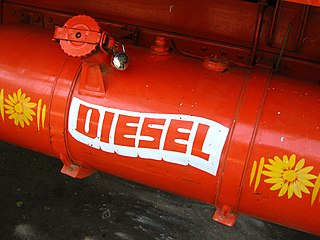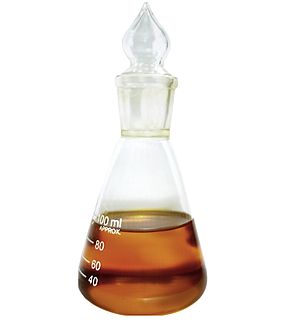Related Research Articles

Diesel fuel in general is any liquid fuel specifically designed for use in diesel engines, in which fuel ignition takes place, without any spark, as a result of compression of the inlet air mixture and then injection of fuel. Therefore, diesel fuel needs good compression ignition characteristics.

Biodiesel is a form of diesel fuel derived from plants or animals and consisting of long-chain fatty acid esters. It is typically made by chemically reacting lipids such as animal fat (tallow), soybean oil, or some other vegetable oil with an alcohol, producing a methyl, ethyl or propyl ester by the process of transesterification.

Rebar, known when massed as reinforcing steel or reinforcement steel, is a steel bar or mesh of steel wires used as a tension device in reinforced concrete and reinforced masonry structures to strengthen and aid the concrete under tension. Concrete is strong under compression, but has weak tensile strength. Rebar significantly increases the tensile strength of the structure. Rebar's surface is often "deformed" with ribs, lugs or indentations to promote a better bond with the concrete and reduce the risk of slippage.

ASTM International, formerly known as American Society for Testing and Materials, is an international standards organization that develops and publishes voluntary consensus technical standards for a wide range of materials, products, systems, and services. Some 12,575 ASTM voluntary consensus standards operate globally. The organization's headquarters is in West Conshohocken, Pennsylvania, about 5 mi (8.0 km) northwest of Philadelphia.

A volumetric flask is a piece of laboratory apparatus, a type of laboratory flask, calibrated to contain a precise volume at a certain temperature. Volumetric flasks are used for precise dilutions and preparation of standard solutions. These flasks are usually pear-shaped, with a flat bottom, and made of glass or plastic. The flask's mouth is either furnished with a plastic snap/screw cap or fitted with a joint to accommodate a PTFE or glass stopper. The neck of volumetric flasks is elongated and narrow with an etched ring graduation marking. The marking indicates the volume of liquid contained when filled up to that point. The marking is typically calibrated "to contain" at 20 °C and indicated correspondingly on a label. The flask's label also indicates the nominal volume, tolerance, precision class, relevant manufacturing standard and the manufacturer's logo. Volumetric flasks are of various sizes, containing from 1 milliliter to 20 liters of liquid.

Jet fuel or aviation turbine fuel is a type of aviation fuel designed for use in aircraft powered by gas-turbine engines. It is colorless to straw-colored in appearance. The most commonly used fuels for commercial aviation are Jet A and Jet A-1, which are produced to a standardized international specification. The only other jet fuel commonly used in civilian turbine-engine powered aviation is Jet B, which is used for its enhanced cold-weather performance.
EN 14214 is a standard published by the European Committee for Standardization that describes the requirements and test methods for FAME - the most common type of biodiesel.

An equestrian helmet is a form of protective headgear worn when riding horses. This type of helmet is specially designed to protect the rider’s head in the event of falls from a horse, especially from striking a hard object while falling or being accidentally struck in the head by a horse’s hoof.
The National Biodiesel Board (NBB) is an American commercial trade association representing the biodiesel industry as the unifying and coordinating body for research and development in the United States. Its mission is to advance the interests of members by creating sustainable biodiesel industry growth. NBB works to remove barriers to the industry and educate the public about biodiesel. It offers regulatory, technical, communications, education, and petroleum outreach programs.

Sun protective clothing is clothing specifically designed for sun protection and is produced from a fabric rated for its level of ultraviolet (UV) protection. A novel weave structure and denier may produce sun protective properties. In addition, some textiles and fabrics employed in the use of sun protective clothing may be pre-treated with UV-inhibiting ingredients during manufacture to enhance their effectiveness.
ASTM A53 is a carbon steel alloy, used as structural steel or for low-pressure plumbing. The alloy specifications are set by ASTM International, in specification ASTM A53/A53M.

Biodiesel is commercially available in most oilseed-producing states in the United States. As of 2005, it is more expensive than petroleum-diesel, though it is still commonly produced in relatively small quantities.

Bituminous waterproofing systems are designed to protect residential and commercial buildings. Bitumen is a mixed substance made up of organic liquids that are highly sticky, viscous, and waterproof. These systems are sometimes used to construct roofs, in the form of roofing felt or roll roofing products.

Biodiesel has a number of standards for its quality.

Koehler Instrument, or Koehler, is a US company which provides petroleum and petrochemical testing equipment and technical support services to testing laboratories worldwide. The company’s corporate headquarters is in Holtsville, NY and the manufacturing headquarters is in Bohemia, NY.
A physical test is a qualitative or quantitative procedure that consists of determination of one or more characteristics of a given product, process or service according to a specified procedure. Often this is part of an experiment.

Package testing or packaging testing involves the measurement of a characteristic or property involved with packaging. This includes packaging materials, packaging components, primary packages, shipping containers, and unit loads, as well as the associated processes.

Winter diesel fuel refers to diesel fuel enhanced to prevent it from gelling in cold weather conditions. In general it is achieved by treatment with additives that change the low temperature characteristics of the fuel.

Anton Paar ProveTec, formerly known as Petrotest GmbH, is a German company within the Anton Paar group that is known for its laboratory equipment for the chemical and petrochemical industries. Furthermore, Anton Paar ProveTec is manufacturing measurement instruments for the cosmetics industry, the aroma and fragrance industry, the food, and pharmaceutical industry. The company was founded in 1873 by Berthold Pensky, who also invented the Pensky-Martens flash point tester. The company is ISO-9001 certified and located south of Berlin in Dahlewitz.

HFRR is a measurement for lubrication of Diesel or heating oil and stands for high frequency reciprocating rig. The value is given in μm, lower is better. The measured value is the diameter of the flattening of the ball after the test.